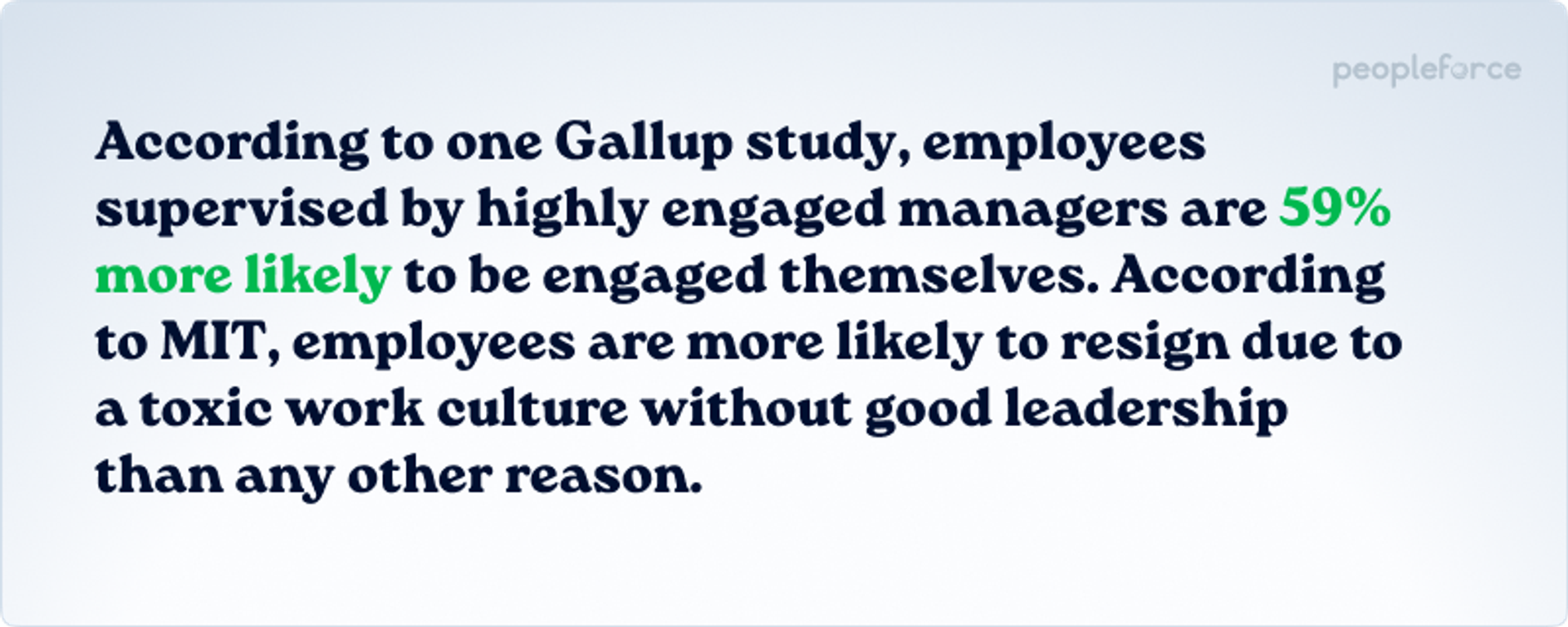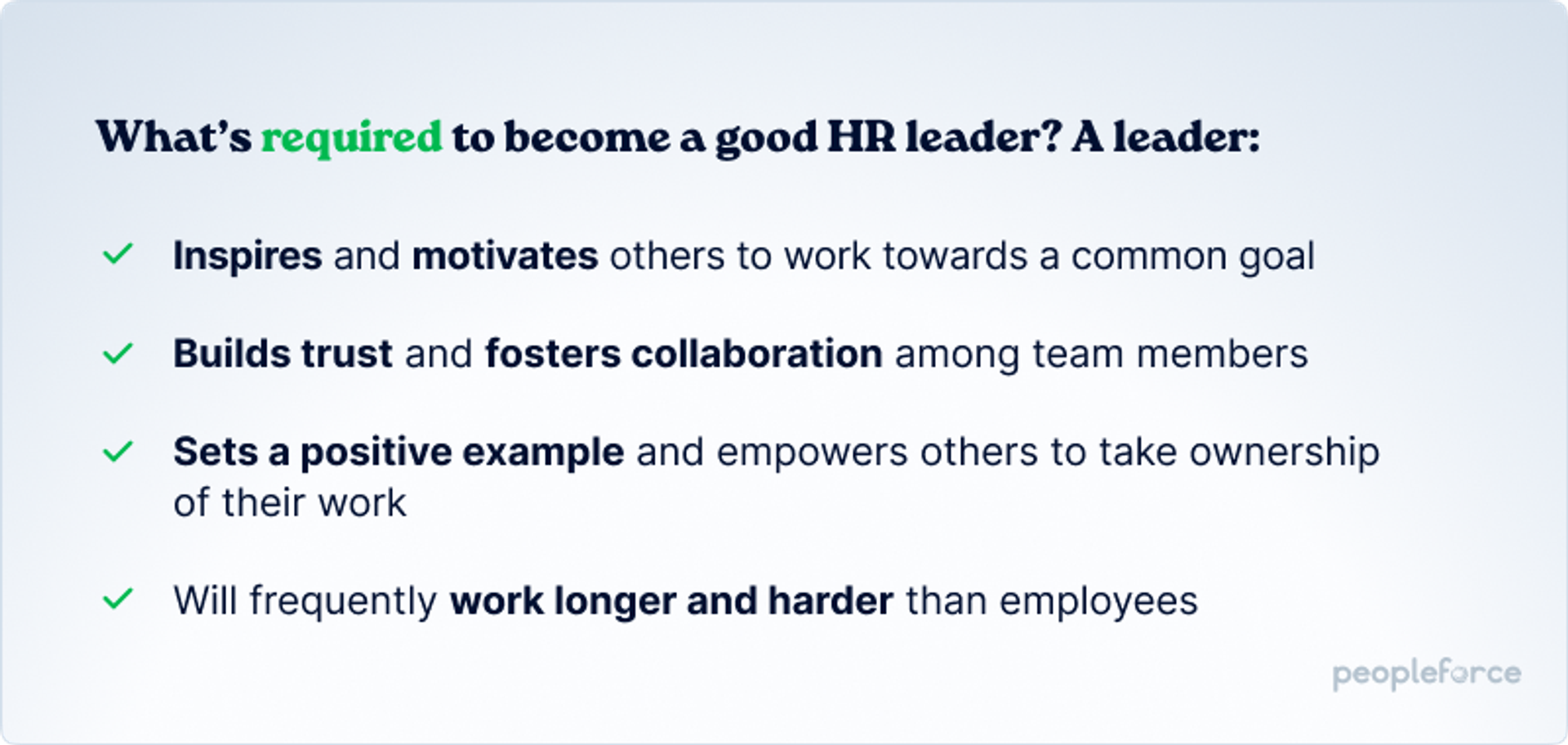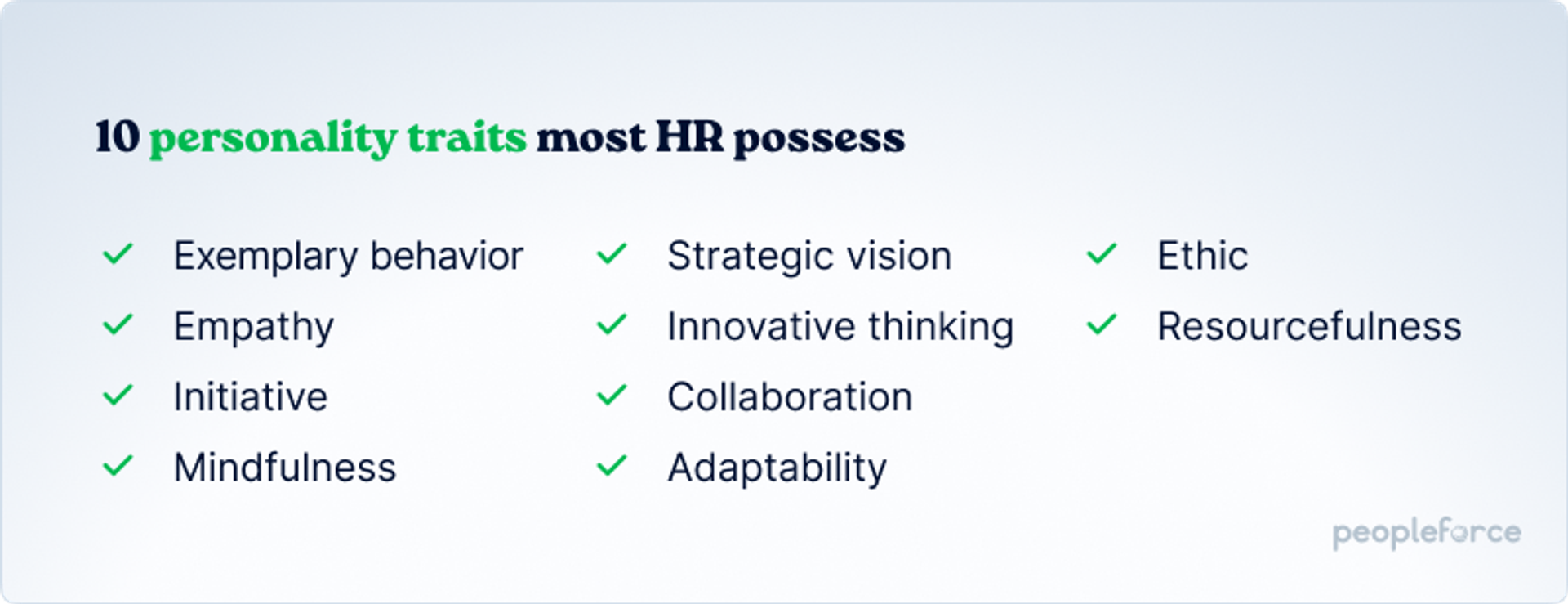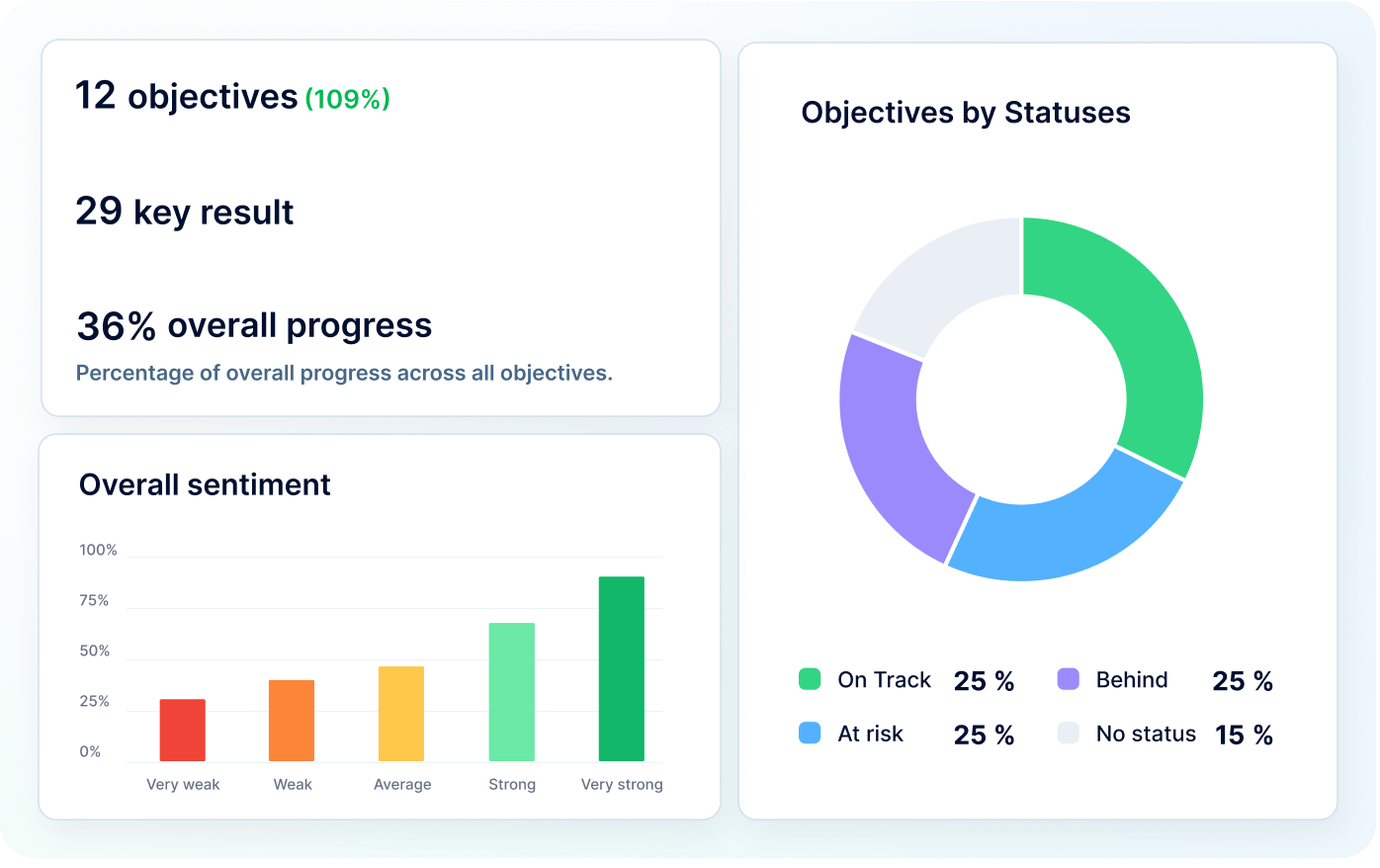
How to be an outstanding HR leader
If you were to go to Amazon right now, head over to the website's book section, and type in ‘leadership,’ you would be overwhelmed with choices. It's a subject matter you can find discussed on podcasts of all varieties, on television, and so on.
It's everywhere, and everyone seems to have an opinion on how to be a good leader. We live in a society where people are constantly challenged to lead and not be ‘sheep,’ so we shouldn't be surprised that it's such a pervasive topic.
If you were to ask HR professionals, they too would have their own opinions about what exactly makes a good HR leader, likely based on their own experiences, successes, and even mistakes. We spoke with some of our clients and examined our own experiences to understand more about how you can become a top leader in our industry.
Why is leadership so important in HR?
Leadership requires you to lead. This is a simplistic statement, perhaps but it holds true, you cannot hide behind anyone else’s responsibility or authority, you must stand on your own two feet and be comfortable with acting without worrying about mistakes or failure. A leader has to act decisively and be prepared to take accountability.
For those who are able to exhibit these characteristics the rewards for themselves and for their companies are clear. According to one study by Gallup, employees who are supervised by highly engaged managers are 59% more likely to be engaged themselves, and according to MIT, employees are more likely to resign due to a toxic work culture without good leadership than any other reason.
For individuals new to management positions this can be daunting, and there’s always the temptation to do everything yourself. So how do you avoid micromanaging and instead focus on empowering leadership?

What’s required to become a good HR leader?
Great leadership in HR starts by leading by example, and a common analogy is to make a distinction between a boss and a leader. We can break this down into more detail:
A boss:
- Relies on power structures and hierarchies to enforce compliance
- Micromanages and controls their subordinates
- Uses fear or coercion to get their employees to perform actions
- Will frequently work less than employees
A leader:
- Inspires and motivates others to work towards a common goal
- Builds trust and fosters collaboration among team members
- Sets a positive example and empowers others to take ownership of their work
- Will frequently work longer and harder than employees
Leadership is a quality that not everyone is born with, but most people can learn how to become someone that their team looks up to. As such, it's a good idea to do some reading and attend education courses to build up your skills.
You must also invest in empathy and communication skills as that's the hallmark of being a leader, rather than a boss. You must consider how your actions will affect those around you and anticipate how emotional reactions can disrupt the workplace, so explain your decisions with clarity and precision.

Ten personality traits HR leaders possess
We've already discussed how to become a great leader, but what are the key personal qualities that a leader should possess? In this article, we'll delve into the specifics and examine how other attributes play a major role in successful leadership. Let's start with one of the most important:
1) Exemplary behavior
To be a great HR leader, you must display exemplary behavior and lead by example. You have to work harder, be prepared to take risks, experiment with new ideas, and think outside the box more than anyone else on your team. This is the only way you can achieve what you expect from your employees.
2) Empathy
Being a great HR leader requires a high degree of empathy. You must understand the emotional concerns of your employees if you want to get the best results out of them. Even if you struggle to express emotion yourself, you can still learn to understand the impact your decisions will have on your team. Always try to put yourself in your team member's shoes when making decisions, allow them to save face when possible, and never act in anger or frustration.
3) Initiative
This key skill comes in two forms. First, good leaders aren't afraid to act on their own and take risks without receiving orders from above. You have to be prepared to make decisions yourself; otherwise, your department isn't truly your own. Second, you should foster a working environment that makes your employees feel comfortable taking risks without fear of failure.
4) Mindfulness
It's essential to be mindful of your limitations and restrictions, especially if you're the head of an HR team. Everyone has faults, and all companies place limits on what their employees can do. Be aware of them, and if you can't overcome them, work to improve how you operate under them. Go into your daily activities with a positive attitude and set reasonable goals for what you can achieve. By doing so, you'll provide a great example to your employees.
5) Strategic vision
Strategic thinking is long-term and predicated on achieving major goals, whereas tactical thinking is about how to achieve actions in the short and medium term. As an HR leader, you must think long-term and plan out how you will achieve strategic goals, rather than just focusing on the decisions you make day to day. Well-implemented tactics achieve strategic goals.
6) Innovative thinking
We’ve already discussed why it’s important for HR leaders to take risks by implementing innovative tactics, strategies, technologies, etc, at their company. When well-researched and planned, using new concepts like this can significantly boost your effectiveness and provide a competitive advantage. If you fail to be innovative, you’ll find in short order that you’re less effective and that your team will likely find itself out-performed.

7) Collaboration
It’s often tempting to do everything yourself, but a true leader realizes that they need to delegate responsibility in order to get the most from their team. Just because you need to work harder than your team members doesn’t mean you have to do everything yourself. Give them the responsibility required to achieve results, and always be willing to work with other leaders at your company too.
8) Adaptability
Survival of the fittest does not mean that winners are always the strongest or the fastest, but rather those that adapt the most quickly. In the corporate rat race, this adage holds as well and HR leaders must be adaptable to adapt rapidly to changing circumstances. Take the COVID-19 pandemic, the companies that adapted the quickest (by setting up remote working for example) were the most likely to survive.
9) Ethic
In HR you’re working with people after all, not numbers, and the decisions that you make are going to affect the lives of employees personally. With this being in mind, you must have a strong ethical code on which you base your decisions, one that fully appreciates the impact that they may have. Do not break or compromise your ethics and make them clear to your employees, and you will garner their respect.
10) Resourcefulness
Things are going to go wrong in your work, no matter how prepared you are or how talented you and your team are, so you’re going to require good problem-solving skills if you want to be a good HR leader. It’s easy to resolve issues related to your outstanding workers, much less so with those that are underperforming, or when your tech systems go down. Study how to think outside of the box and solve problems when they occur, and you should be able to react to almost any situation.
Do you have what it takes to be a top HR leader?
Do you have your own ideas about what makes a good HR leader, or perhaps you have experience of being a leader yourself and would like to share it? Then please get in touch. We always love to hear the thoughts of other HR professionals and how they learned from their own experiences, and indeed, mistakes.
That’s what we do at PeopleForce, we‘re always learning. That’s how we provide automated HR processes via a number of different modules designed to make key functions like onboarding, hiring, review management, etc easier.
When you are resourceful you have time to focus on more important issues and think strategically, perfect for any great HR leader. So send us a message, and one of our experts will help you out.
With over five years in HR tech content creation, Maria explores how technology, people, and culture shape the workplace of today. Her interests include HR, AI, IT, and personal development, and she brings a data-driven, human-centered perspective to her writing.
Get started with PeopleForce today
Automate your HR routine to create a high performance culture in your company. PeopleForce is your best HRM alternative to stay business driven but people focused.

Recent articles
Top 10 ATS systems: The ultimate recruiter's guide
Looking for the best ATS? Compare the top 10 ATS systems by features, pricing, and user reviews to find the perfect hiring solution for your team.
🎉 PeopleForce Wrapped 2025: a year of HR magic
2025 wasn’t just about shipping features — it was about making HR work better at scale. Let’s unwrap everything we built together.
Get Ready for the EU Pay Transparency Directive with PeopleForce
Discover the key obligations of the Pay Transparency Directive and see how PeopleForce helps organisations prepare the structures, processes, and data needed to comply with the new requirements.

